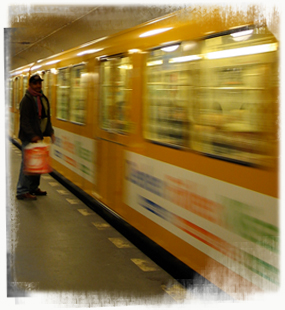

She darted at me, very upset. The German came thick and fast and all I could make out was “Kein Foto!”
Taken aback, I lowered my camera and tried to assure her that I wouldn’t take any more photos. But I was bewildered as to why she was so perturbed.
All I was doing was trying to compose a landscape image that would capture the sun on the buildings across the frozen river, which picked up the colours on her orange coat and colourful stall.
An English-speaking gent who was handing out flyers helped me out: apparently, she was worried I was a Chinese entrepreneur with evil intentions of mass-producing her designs based on the photos I was taking.
Germany might be an industrial world leader and a powerhouse in design and technology, but competition from China – and worse, the flagrant disregard for copyright – is hard on small, struggling artisans such as this lady, who only sells her wares at flea markets.
A couple of years later, I was browsing at a Weihnachtsmarkt stall selling traditional German wooden decorations. I should buy these, cajoled the stall owner, because “Die sind made-in-Germany”.
Yes, the Chinese were churning out such impeccable reproductions of the most Deutsch of German nutcrackers, arches and pyramids, that locally-handcrafted products had to be pointed out.
But it is not only the small fry who are affected by Chinese competition – hardly any sector of the German economy is untouched.
That cheap China-made products were flooding German stores was a real surprise to me when I first arrived in Berlin. But why should German companies be different to those from any other country in pursuit of cheap labour as the route to higher profits?
Back at the flea market, I employed the English-speaker’s help to apologise to the stall owner for upsetting her, and also firmly impress upon her that not every camera-toting Chinese-looking person should be regarded with suspicion.
She calmed down but I had missed the rare sunny shot and remained agitated the rest of the walk. Luckily, a year later, another artesan was more than fine with my photographing her lovely handiwork. ω
Statistically Speaking:
In 2013, Germany was China’s 6th biggest trading partner; China was Germany’s 5th biggest trading partner. According to the BBC World Service 2013 Poll, 67% of Germans polled viewed Chinese influence on the world negatively but only 32% of Chinese people viewed Germany’s influence negatively.
Experienced: 04.12.2010 || Recounted: 30.10.2014
If you see this after your page is loaded completely, leafletJS files are missing.



